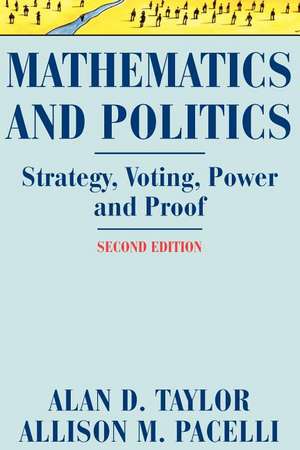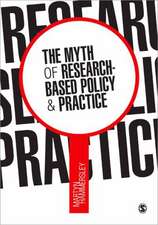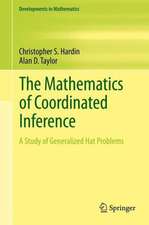Mathematics and Politics: Strategy, Voting, Power, and Proof
Autor Alan D. Taylor, Allison M. Pacellien Limba Engleză Paperback – 29 oct 2010
| Toate formatele și edițiile | Preț | Express |
|---|---|---|
| Paperback (1) | 393.13 lei 6-8 săpt. | |
| Springer – 29 oct 2010 | 393.13 lei 6-8 săpt. | |
| Hardback (1) | 431.13 lei 3-5 săpt. | +35.77 lei 7-11 zile |
| Springer – 5 sep 2008 | 431.13 lei 3-5 săpt. | +35.77 lei 7-11 zile |
Preț: 393.13 lei
Nou
Puncte Express: 590
Preț estimativ în valută:
75.23€ • 77.05$ • 62.58£
75.23€ • 77.05$ • 62.58£
Carte tipărită la comandă
Livrare economică 18 martie-01 aprilie
Preluare comenzi: 021 569.72.76
Specificații
ISBN-13: 9781441926616
ISBN-10: 1441926615
Pagini: 380
Ilustrații: XVI, 364 p.
Dimensiuni: 155 x 235 x 20 mm
Greutate: 0.54 kg
Ediția:Softcover reprint of hardcover 2nd ed. 2009
Editura: Springer
Colecția Springer
Locul publicării:New York, NY, United States
ISBN-10: 1441926615
Pagini: 380
Ilustrații: XVI, 364 p.
Dimensiuni: 155 x 235 x 20 mm
Greutate: 0.54 kg
Ediția:Softcover reprint of hardcover 2nd ed. 2009
Editura: Springer
Colecția Springer
Locul publicării:New York, NY, United States
Public țintă
ResearchCuprins
Social Choice.- Yes–No Voting.- Political Power.- Conflict.- Fairness.- Escalation.- More Social Choice.- More Yes–No Voting.- More Political Power.- More Conflict.- More Fairness.- More Escalation.
Recenzii
From the reviews of the second edition:
“Mathematics and Politics is the fruit of undergraduate mathematics courses taught by the authors. The primary audience is political and social science majors. … The writing style is appropriate for the intended audience with the understanding that the students/readers have some familiarity with political science economics or sociology. … Overall the book serves as a useful quantitative introduction to several of the covered topics. … Faculty in the social sciences should strongly consider Mathematics and Politics as a resource/reference.” (J. Douglas Barrett, Technometrics, Vol. 53 (1), February, 2011)
“It is intended to serve as a text for social science and humanities students that will highlight the power and utility of mathematics. … if you are considering a course as described above, this textbook deserves to be the one that will entice you into taking the plunge. And if you simply want to educate yourself in areas of social science mathematics that have only recently started to get the attention they deserve, Mathematics and Politics deserves your strong consideration.” (Edward W. Packel, SIAM Review, Vol. 52 (4), 2010)
“Mathematics and Politics is the fruit of undergraduate mathematics courses taught by the authors. The primary audience is political and social science majors. … The writing style is appropriate for the intended audience with the understanding that the students/readers have some familiarity with political science economics or sociology. … Overall the book serves as a useful quantitative introduction to several of the covered topics. … Faculty in the social sciences should strongly consider Mathematics and Politics as a resource/reference.” (J. Douglas Barrett, Technometrics, Vol. 53 (1), February, 2011)
“It is intended to serve as a text for social science and humanities students that will highlight the power and utility of mathematics. … if you are considering a course as described above, this textbook deserves to be the one that will entice you into taking the plunge. And if you simply want to educate yourself in areas of social science mathematics that have only recently started to get the attention they deserve, Mathematics and Politics deserves your strong consideration.” (Edward W. Packel, SIAM Review, Vol. 52 (4), 2010)
Textul de pe ultima copertă
Mathematics and Politics requires no prerequisites in either subject. The underlying philosophy involves minimizing algebraic computations while focusing on the conceptual aspects of mathematics in the context of real-world questions in political science. This new addition has an added co-author, Allison Pacelli, and covers six major topics: social choice, yes-no voting systems, political power, game-theoretic models of international conflict, fairness, and escalation. In addition to having two new chapters (treating apportionment and conflict resolution), the text has been extensively reorganized and the number of exercises increased to over 300.
EXCERPTS FROM REVIEWS OF THE FIRST EDITION
"Taylor has done a remarkable job of showing the power of deductive reasoning in … the strategic choices actors make in conflict situations … a penetrating analysis of both real-life and hypothetical situations."
-- Steven Brams, New York University
Alan Taylor’s book is carefully crafted. He is ever aware of his audience, but relentlessly presses the beginning student to understand more and more."
-- Samuel Merrill III, American Mathematical Monthly
This book is a unique and valuable source … Coverage is thorough and extensive; ideas are explained clearly and at an appropriate mathematical level."
-- Ed Packel, Lake Forest College
"… Mathematics and Politics is a nearly perfect solution, either for classes or for the serious professional who wants to retool. … The writing is crisp, and the sense of excitement about learning mathematics is seductive."
-- Michael Munger, Chance
" I like this book. It’s nice mathematics with serious applications."
-- John Ewing, Indiana University
"Now we have, in Alan Taylor’s book, an introduction to these ideas that is delightfully lucid and requiresalmost no mathematical prerequisites."
-- Phillip D. Straffin, College Mathematics Journal
"[The book] breaks new ground and could stand as the definitive undergraduate textbook in this area for quite some time."
-- Stan Wagon, Macalester College
EXCERPTS FROM REVIEWS OF THE FIRST EDITION
"Taylor has done a remarkable job of showing the power of deductive reasoning in … the strategic choices actors make in conflict situations … a penetrating analysis of both real-life and hypothetical situations."
-- Steven Brams, New York University
Alan Taylor’s book is carefully crafted. He is ever aware of his audience, but relentlessly presses the beginning student to understand more and more."
-- Samuel Merrill III, American Mathematical Monthly
This book is a unique and valuable source … Coverage is thorough and extensive; ideas are explained clearly and at an appropriate mathematical level."
-- Ed Packel, Lake Forest College
"… Mathematics and Politics is a nearly perfect solution, either for classes or for the serious professional who wants to retool. … The writing is crisp, and the sense of excitement about learning mathematics is seductive."
-- Michael Munger, Chance
" I like this book. It’s nice mathematics with serious applications."
-- John Ewing, Indiana University
"Now we have, in Alan Taylor’s book, an introduction to these ideas that is delightfully lucid and requiresalmost no mathematical prerequisites."
-- Phillip D. Straffin, College Mathematics Journal
"[The book] breaks new ground and could stand as the definitive undergraduate textbook in this area for quite some time."
-- Stan Wagon, Macalester College
Caracteristici
Two new chapters on “Fairness” and “More Fairness” have been added Examples and exercises have been updated and enhanced throughout
















